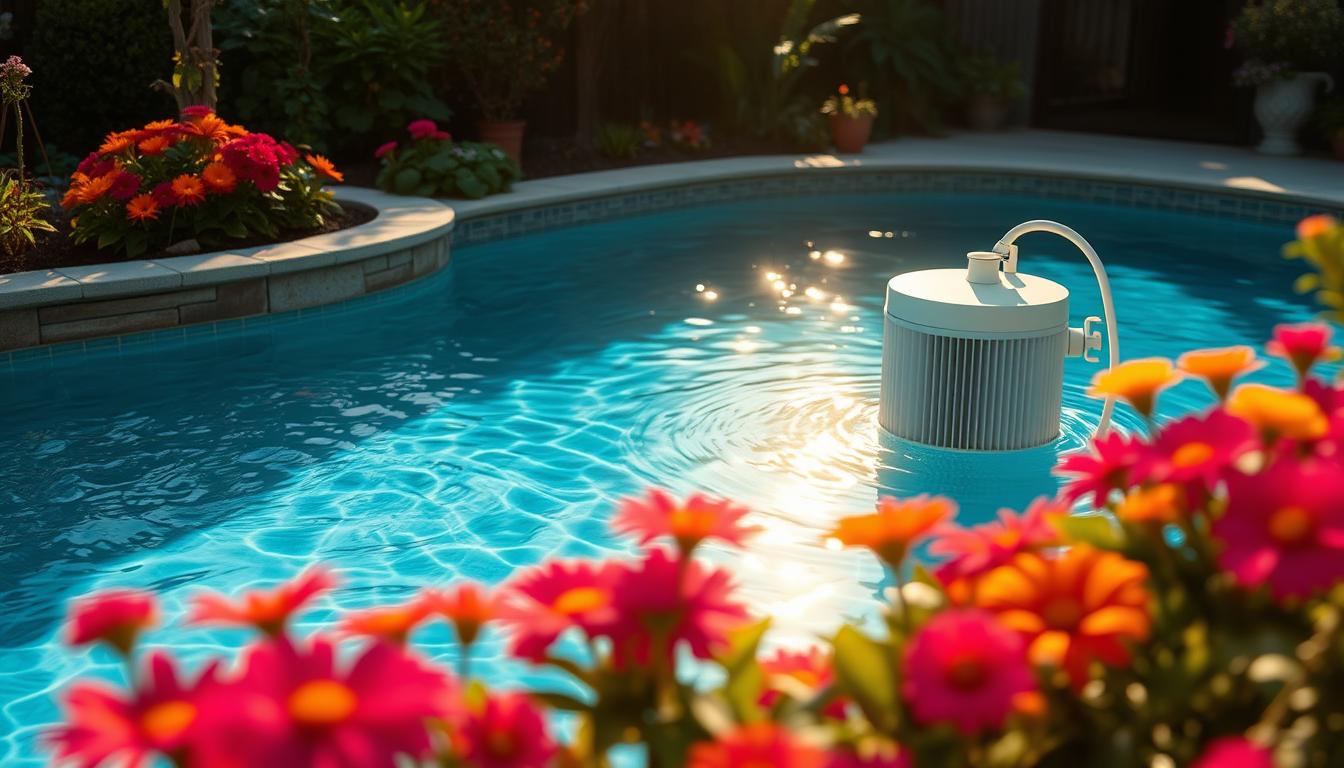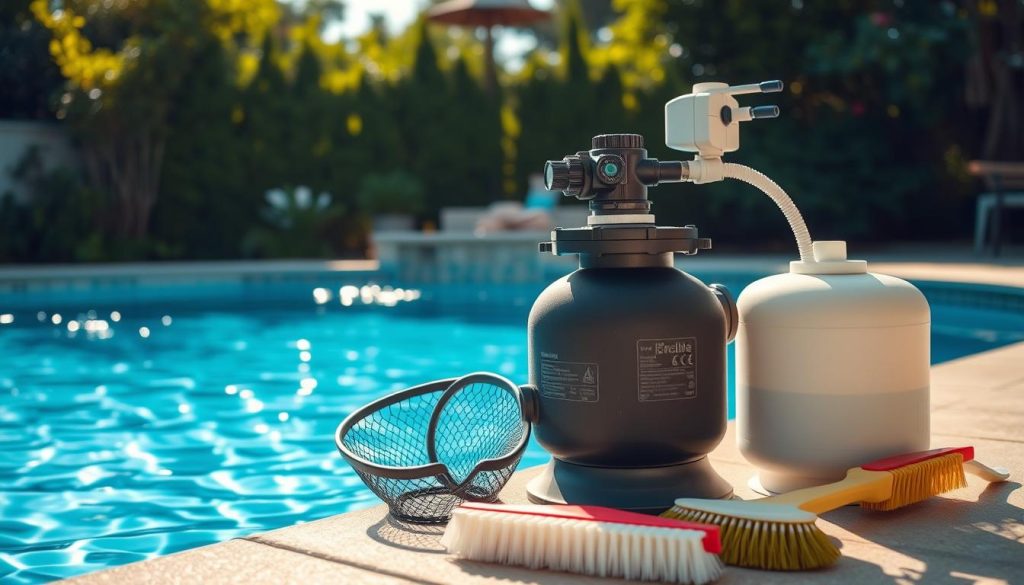
Upgrading to energy-efficient pool pumps can save you up to 83% on annual costs. This is compared to traditional single-speed pumps. Balancing proper filtration and energy efficiency is crucial for a clean pool and lower bills.
Most household pools need a turnover rate of 6 to 8 hours daily. This ensures effective filtering and cleanliness. However, several factors affect the ideal pool filter schedule for your specific pool.
These factors include pool size, usage, seasonal changes, and filter type. Understanding these variables is key to optimizing your pool maintenance routine.
This guide explores pool filtration and proper water circulation. You’ll learn how long your pool filter should run for the best results. We’ll equip you with knowledge to make smart decisions about your pool filter runtime.
Key Takeaways
- Optimal pool filter runtime depends on factors like pool size, usage, and turnover rate
- Energy-efficient pool pumps can significantly reduce annual energy costs
- Seasonal adjustments to pool filter scheduling help prevent algae growth and maintain water clarity
- Different types of pool filters may require varying filtration times for optimal performance
- Regular monitoring of water quality is essential for determining the ideal pool filter runtime
Understanding Pool Filtration Basics
Pool filtration is vital for a clean and healthy swimming environment. It removes contaminants, debris, and unwanted particles from your pool water. A well-functioning system ensures a safe and pleasant swimming experience.
Importance of Proper Pool Filtration
Proper filtration keeps water clear and free of harmful bacteria and algae. It also prevents health issues for swimmers. Effective filtration extends the life of your pool equipment by reducing strain on components.
A high-quality filtration system can save money on costly repairs. Regular maintenance ensures your pool remains enjoyable for years to come.
Types of Pool Filters
There are three main types of pool filters: cartridge, sand, and diatomaceous earth (D.E.). Each type has unique benefits and drawbacks. Your choice depends on pool size, budget, and maintenance preferences.
| Filter Type | Characteristics |
|---|---|
| Cartridge Filters | Common among fiberglass pool owners, utilize cylindrical cartridges of fine, pleated mesh material to filter impurities using a tight mesh of fabric. |
| Sand Filters | Have diameters ranging from 2 to 4 feet, water pushes through sand to strain out impurities. |
| Diatomaceous Earth (D.E.) Filters | Typically have 24 to 72 square feet of filter media surface area, available in vertical grid or spin (horizontal wheel-shaped grids) configurations. |
Factors Affecting Filtration Efficiency
Several factors impact pool filtration efficiency. These include equipment usage, filter cycle duration, and ideal filter settings. Pool use frequency, nearby debris, and weather can affect how hard your system works.
Regular monitoring of your filter’s pressure gauge is important. Adjust your pool filter cycle duration as needed. Stay informed about pool filter settings to keep your water crystal-clear.
Determining Optimal Pool Filter Runtime
Clean pools need proper filter runtime. Several factors affect this, including pool size, filter type, and usage level. Your pool’s turnover rate helps determine the ideal filter runtime.
Calculating Turnover Rate
Turnover rate is how long it takes to circulate all pool water. To calculate it, you need pool volume and pump flow rate. Backyard pools typically hold 40,000 to 100,000 liters.
For example, a 70,000-liter pool with a 210 liter/minute pump needs 5.5-6 hours for one turnover.

Considering Pool Size and Usage
Pool size and usage affect optimal filter runtime. Aim for one turnover in 4-6 hours for residential pools. Larger or heavily used pools may need longer runtimes.
Increase pump runtime during heavy use, after rainstorms, or in extreme heat. This ensures proper filtration and water quality.
| Pool Volume (Liters) | Pump Flow Rate (Liters/Minute) | Turnover Time (Hours) |
|---|---|---|
| 50,000 | 200 | 4.2 |
| 70,000 | 210 | 5.6 |
| 90,000 | 220 | 6.8 |
Seasonal Adjustments
Seasons affect optimal filter runtime. In summer, run the pump 8-10 hours daily. Add 1 hour for every 10°C above 15°C.
In colder months, reduce runtime but maintain at least 6 hours daily. This ensures proper circulation and prevents algae growth.
Investing in a variable speed pump can help you adjust your filter’s runtime and speed for optimal efficiency, potentially saving energy and costs while prolonging your pool filter lifespan.
Adapt your filter runtime to your pool’s needs. This ensures a clean, healthy swimming environment. Regular maintenance is crucial for optimal efficiency and longevity.
How Long Should Pool Filter Run for Optimal Results
Run your pool filter for at least 8 hours daily. This ensures proper water circulation and filtration. Your pump should be sized correctly for your pool’s volume.
To save on electricity bills, run your pump during off-peak hours. Split the runtime into two sessions throughout the day. This maintains consistent circulation while avoiding higher energy costs.
Advanced pool pump technologies can boost efficiency and cost-effectiveness. Variable speed pumps can save up to 83% on yearly energy costs. They reduce bills, minimize noise, and last longer.
Smart pumps allow remote monitoring and control of maintenance tasks. This provides flexibility in managing your pool efficiently. Regular monitoring and adjusting of your pump schedule is vital.
Adjust the speed and runtime based on pool size and usage patterns. This ensures optimal condition while minimizing energy consumption. Upgrading to eco-friendly models benefits both your wallet and the environment.







